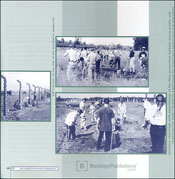|
|
Learning from HistoryComments on efforts by Volkswagen's workforce, labor representatives, executives, and corporate management to come to terms with the issue of forced labor during the Third Reich
Softcover,
8 5/8 in. x 8 5/8 in. |
Volkswagen History
Learning from History: Comments on efforts by Volkswagen's workforce, labor representatives, executives, and corporate management to come to terms with the issue of forced labor during the Third Reich
This book is volume 1 of Historical Notes, a series of publications from the Volkswagen AG Corporate History, Wolfsburg, Germany
Volume 2: The British and their Works
Volume 4: Ivan Hirst
Volume 7: Volkswagen Chronicle
| Widespread approval greeted Volkswagen's decision in July 1998 to establish a humanitarian fund to make the first direct payments to help improve the lives of the individuals who had worked as forced laborers for its corporate forerunner under the Third Reich. But there were expressions of surprise as well. "Why is Volkswagen doing this?more than fifty years after the collapse of Nazi Germany?" Questions like this were frequently heard from media representatives, including foreign journalists. |
| |||
Their surprise was understandable. Just a few months prior, Volkswagen had stated that it felt compelled to stand by the generally accepted legal position with regard to direct compensation payments to former forced laborers. The essence of this position?which is universally shared by German companies whose predecessors used forced laborers to manufacture armaments during the Third Reich?is that forced labor was an injustice emanating from the Nazi state. It was an integral and pervasive part of the wartime economy brought about by the Nazi state. Forced laborers were employed not just in industry, but in agriculture and by public entities as well. Legal claims resulting from forced labor can thus be asserted only against the Federal Republic of Germany as the legal successor to the Third Reich. The Federal Republic of Germany has faced up to its responsibility for National Socialist injustice by entering into a network of international agreements and by enacting national compensation legislation.
Less well known than the above is that the process of actively facing up to the injustice of forced labor has been under way at Volkswagen for almost twenty years. This has included consideration of the moral as well as the legal dimensions of the issue. The need to face up to the past in this manner is all the more obvious in areas in which later generations, while bearing no direct responsibility, nevertheless have an obligation to learn from history and to show their respect for the victims of injustice. The establishment of the Humanitarian Fund is a continuation of this process.

BSIN: H820
ISBN: 0-8376-1312-4 (ISBN-10)
ISBN: 978-0-8376-1312-3 (ISBN-13)
Permalink: http://www.bentleypublishers.com/c/H820
![[B] Bentley Publishers](http://assets1.bentleypublishers.com/images/bentley-logos/bp-banner-234x60-bookblue.jpg)



